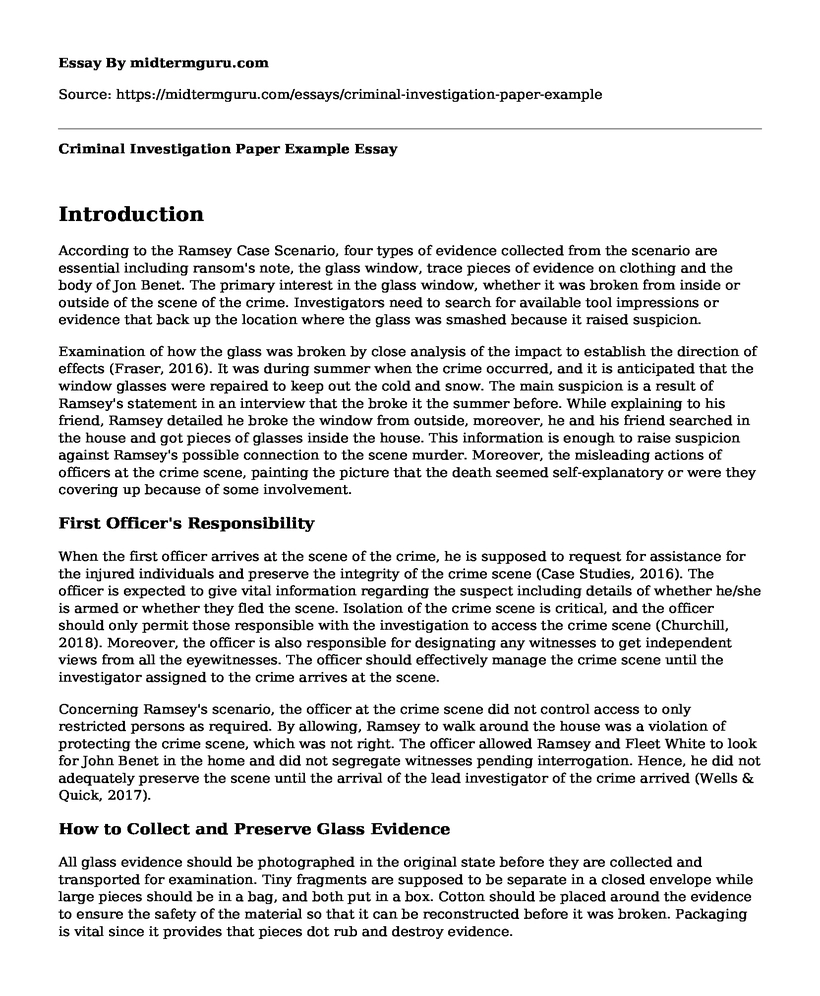Introduction
According to the Ramsey Case Scenario, four types of evidence collected from the scenario are essential including ransom's note, the glass window, trace pieces of evidence on clothing and the body of Jon Benet. The primary interest in the glass window, whether it was broken from inside or outside of the scene of the crime. Investigators need to search for available tool impressions or evidence that back up the location where the glass was smashed because it raised suspicion.
Examination of how the glass was broken by close analysis of the impact to establish the direction of effects (Fraser, 2016). It was during summer when the crime occurred, and it is anticipated that the window glasses were repaired to keep out the cold and snow. The main suspicion is a result of Ramsey's statement in an interview that the broke it the summer before. While explaining to his friend, Ramsey detailed he broke the window from outside, moreover, he and his friend searched in the house and got pieces of glasses inside the house. This information is enough to raise suspicion against Ramsey's possible connection to the scene murder. Moreover, the misleading actions of officers at the crime scene, painting the picture that the death seemed self-explanatory or were they covering up because of some involvement.
First Officer's Responsibility
When the first officer arrives at the scene of the crime, he is supposed to request for assistance for the injured individuals and preserve the integrity of the crime scene (Case Studies, 2016). The officer is expected to give vital information regarding the suspect including details of whether he/she is armed or whether they fled the scene. Isolation of the crime scene is critical, and the officer should only permit those responsible with the investigation to access the crime scene (Churchill, 2018). Moreover, the officer is also responsible for designating any witnesses to get independent views from all the eyewitnesses. The officer should effectively manage the crime scene until the investigator assigned to the crime arrives at the scene.
Concerning Ramsey's scenario, the officer at the crime scene did not control access to only restricted persons as required. By allowing, Ramsey to walk around the house was a violation of protecting the crime scene, which was not right. The officer allowed Ramsey and Fleet White to look for John Benet in the home and did not segregate witnesses pending interrogation. Hence, he did not adequately preserve the scene until the arrival of the lead investigator of the crime arrived (Wells & Quick, 2017).
How to Collect and Preserve Glass Evidence
All glass evidence should be photographed in the original state before they are collected and transported for examination. Tiny fragments are supposed to be separate in a closed envelope while large pieces should be in a bag, and both put in a box. Cotton should be placed around the evidence to ensure the safety of the material so that it can be reconstructed before it was broken. Packaging is vital since it provides that pieces dot rub and destroy evidence.
Concerns as an Investigator
The ransom note was of certain disquiet as an investigator. A typical ransom note contains about 40 words (Bryant, 2017) but according to the case study, it had 400 words. As an investigator, it is suspicious of how the window was broken and why the ransom note was overstated. The scenario is of its kind because there were many mistakes committed at the scene and events that should not have happened were overlooked.
References
Bryant, R. P. (2017). Theories of Criminal Investigation. Understanding Criminal Investigation, 13-33. doi:10.1002/9780470682388.ch2
Case Studies. (2016). Coursewareobjects.elsevier.com. Retrieved 22 October 2018, from http://coursewareobjects.elsevier.com/objects/elr/Osterburg/Case_studies/
Churchill, D. (2018). Criminal Investigation. Oxford Scholarship Online. doi:10.1093/oso/9780198797845.003.0007
Fraser, J. (2016). The application of forensic science to a criminal investigation. Handbook of Criminal Investigation. doi:10.4324/9780203118177.ch15
Wells, C., & Quick, O. (2017). Public Order. Lacey, Wells, and Quick Reconstructing Criminal Law Text and Materials, 160-197. doi:10.1017/cbo9780511751028.007
Cite this page
Criminal Investigation Paper Example. (2022, Aug 18). Retrieved from https://midtermguru.com/essays/criminal-investigation-paper-example
If you are the original author of this essay and no longer wish to have it published on the midtermguru.com website, please click below to request its removal:
- Essay Sample: My First Internship at One of the Countys Best Breakfast Cereal Manufacturing Firms
- Essay Sample on Summer Internship at the Rehabilitation Center
- Brief Summary of Forensic Analysis
- Case Study on TAQA Atrush B.V Company
- Article Analysis Essay on Ethical Challenges for Psychology in the Justice System
- Criminal Justice Policies: Theories, Ideologies & Ethical Issues - Essay Sample
- Exploring Beyond Traditional Crime for a More Comprehensive Criminology - Essay Sample







